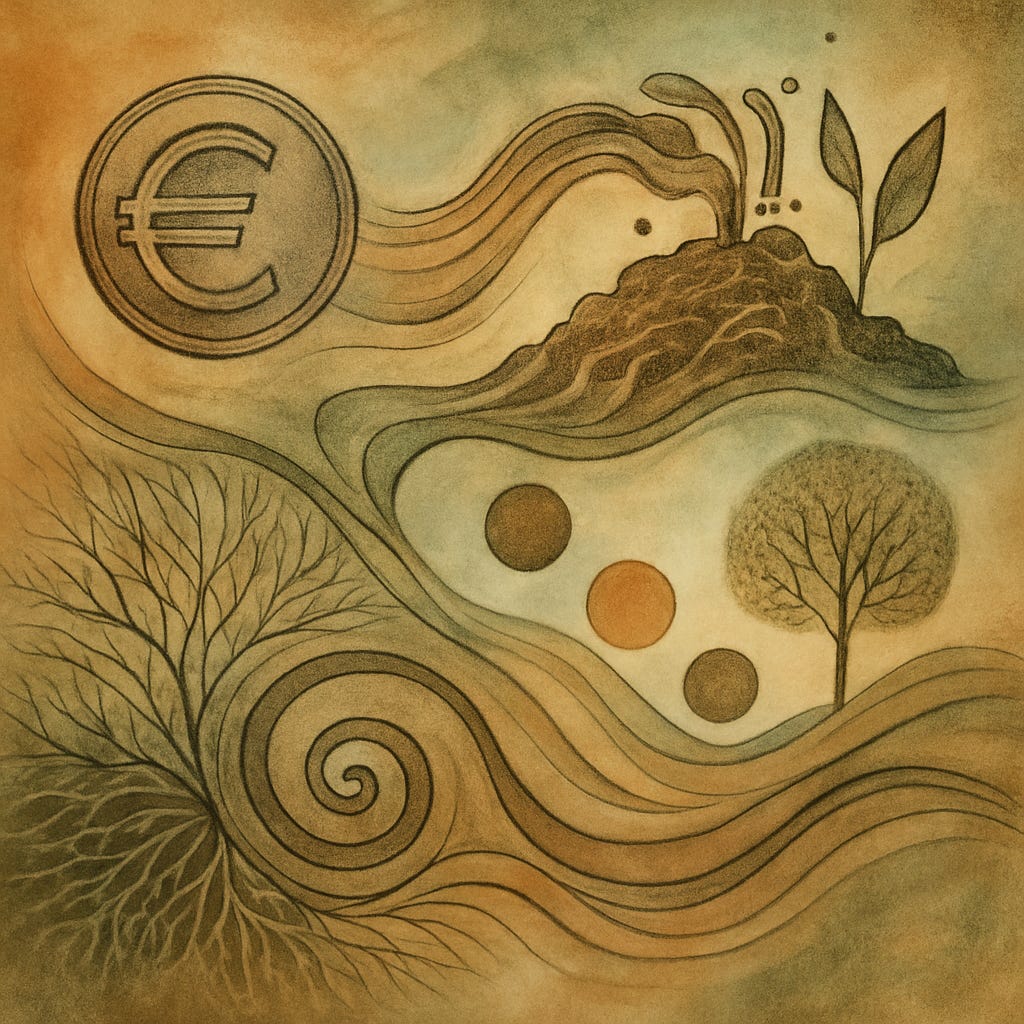Composting Money
back to Life.
We’re all vaguely aware that money—this magical substance we chase endlessly—is deeply fucked. Yet somehow, we keep treating it as if it's just a neutral medium of exchange, a harmless tool for convenience. But peel back the layers, look behind the veil, and you’ll quickly see: money in its current form is a claim on lost life. Literally.
Think about it. Every euro, dollar, or yen we hold represents, directly or indirectly, an extraction—a little piece of something alive ripped out, converted, and sold. It’s a forest cut down, rivers polluted, communities displaced. It’s human potential squandered in factories, life shortened by stress and exploitation, relationships commodified and reduced to their economic utility. This isn't some abstract metaphor—it's thermodynamics, ecology, and lived human experience.
We’ve built an entire civilization on this foundational violence, masking it with GDP growth and sanitized profit statements. And this has left us with an immense ecological and social debt, accrued over generations. Debt hidden beneath monetary abstractions, where externalities—like biodiversity loss or mental breakdowns—don’t show up on any balance sheet. And we've fooled ourselves into believing it all makes sense.
Enter the provocative notion of "composting money."
Yes, literally, currency composting is happening. The Federal Reserve actually sends shredded bills to compost heaps—an amusing, symbolic act. But what if we took the metaphor seriously? What if money itself—this non-compostable abstraction—could be broken down, repurposed, and redirected to nurture life rather than destroy it?
“Composting money” isn't just a catchy phrase; it's an imperative, a radical shift in how we think about value and economic flow. It means designing currencies that mimic nature’s regenerative cycles. Imagine money that decays if hoarded, incentivizing constant circulation and connection rather than stagnation and accumulation. This isn’t theoretical—demurrage currencies existed, briefly, during the Great Depression, sparking local economic revival before being shut down by threatened central banks.
Or picture community-driven currencies that restore economic power to local neighborhoods, mutual credit systems that thrive on trust rather than extraction, and regenerative finance that explicitly channels funds into restoring ecosystems rather than merely exploiting them. Imagine a monetary ecosystem that functions like a forest: diverse, resilient, deeply interconnected, endlessly cycling nutrients, and enriching every participant.
But let’s be real: this isn't simply about technical tweaks to financial instruments. It’s fundamentally about composting power itself—breaking down entrenched hierarchies that benefit from extraction, and redistributing control back to communities and ecosystems. It's about recognizing the profound non-fungibility of what truly sustains life: clean air, thriving forests, meaningful relationships. These can't be reduced to a dollar figure. They’re sacred and irreplaceable.
The idea of composting money isn’t a fantasy. It’s an urgent response to the reality that our current monetary system is hostile to life. It’s a radical but scientifically grounded proposal, anchored in ecological, economic, and social truths. More importantly, it’s doable. Experiments around the world already prove that when we consciously redesign money, we can transform it from a tool of extraction into an engine for regeneration.
It's not complicated. But it is profound.
We already have the tools, the knowledge, and the examples. Now, we need the courage and imagination to compost our abstract claims on lost life, turning them into a vibrant, thriving reality that we can all share.


